X-79
Sailboat specifications
The X-79 is a 26’1” (7.96m) racer-cruiser sailboat designed by Niels Jeppesen (Denmark). She was built between 1979 and 1994 by X-Yachts (Denmark) with 468 hulls completed.
X-79's main features
- Model
- X-79
- Hull type
- Monohull
- Category
- Racer-cruiser sailboat
- Sailboat builder
- Sailboat designer
- Country
- Denmark
- Construction
- GRP (glass reinforced polyester):
Sandwich fiberglass polyester - Number of hulls built
- 468
- First built hull
- 1979
- Last built hull
- 1994
- Appendages
- Keel : fin without bulb
- Helm
- Single tiller
- Rudder
- Single spade rudder
- Unsinkable
- No
- Trailerable
- No
- Standard public price ex. VAT (indicative only)
- N/A €
X-79's main dimensions
- Hull length
- 26’ 1”7.96 m
- Waterline length
- 21’6.4 m
- Beam (width)
- 9’ 5”2.88 m
- Draft
- 4’ 5”1.33 m
- Light displacement (MLC)
- 2965 lb1345 kg
- Ballast weight
- 1477 lb670 kg
X-79's rig and sails
- Upwind sail area
- 419 ft²38.9 m²
- Downwind sail area
- 800 ft²74.3 m²
- Mainsail area
- 219 ft²20.3 m²
- Genoa area
- 200 ft²18.6 m²
- Solent area
- 135 ft²12.5 m²
- Stormjib area
- 54 ft²5 m²
- Symmetric spinnaker area
- 581 ft²54 m²
- Rigging type
- Sloop Marconi 3/4
- Mast configuration
- Keel stepped mast
- Rotating spars
- No
- Number of levels of spreaders
- 1
- Spreaders angle
- 0 °
- Spars construction
- Aluminum spars
- Standing rigging
- 1x19 strand wire continuous
X-79's performances
- Upwind sail area to displacementiThe ratio sail area to displacement is obtained by dividing the sail area by the boat's displaced volume to the power two-thirds.
The ratio sail area to displacement can be used to compare the relative sail plan of different sailboats no matter what their size.
Upwind: under 18 the ratio indicates a cruise oriented sailboat with limited performances especially in light wind, while over 25 it indicates a fast sailboat. - 344 ft²/T31.93 m²/T
- Downwind sail area to displacementiThe ratio sail area to displacement is obtained by dividing the sail area by the boat's displaced volume to the power two-thirds.
The ratio sail area to displacement can be used to compare the relative sail plan of different sailboats no matter what their size. - 656 ft²/T60.98 m²/T
- Displacement-length ratio (DLR)iThe Displacement Length Ratio (DLR) is a figure that points out the boat's weight compared to its waterline length. The DLR is obtained by dividing the boat's displacement in tons by the cube of one one-hundredth of the waterline length (in feet).
The DLR can be used to compare the relative mass of different sailboats no matter what their length:
a DLR less than 180 is indicative of a really light sailboat (race boat made for planning), while a DLR greater than 300 is indicative of a heavy cruising sailboat. - 145
- Ballast ratioiThe Ballast ratio is an indicator of stability; it is obtained by dividing the boat's displacement by the mass of the ballast. Since the stability depends also of the hull shapes and the position of the center of gravity, only the boats with similar ballast arrangements and hull shapes should be compared.
The higher the ballast ratio is, the greater is the stability. - 50 %
- Critical hull speediAs a ship moves in the water, it creates standing waves that oppose its movement. This effect increases dramatically the resistance when the boat reaches a speed-length ratio (speed-length ratio is the ratio between the speed in knots and the square root of the waterline length in feet) of about 1.2 (corresponding to a Froude Number of 0.35) . This very sharp rise in resistance, between speed-length ratio of 1.2 to 1.5, is insurmountable for heavy sailboats and so becomes an apparent barrier. This leads to the concept of "hull speed".
The hull speed is obtained by multiplying the square root of the waterline length (in feet) by 1.34. - 6.14 knots
X-79's auxiliary engine
- Engine(s)
- 1 outboard engine
- Engine(s) power (min./max.)
- 3 HP / 6 HP
- Fuel type
- Gas
X-79's accommodations and layout
- Cockpit
- Closed aft cockpit
- Berth(s) (min./max.)
- 4 / 6
X-79's saloon
- Berth length
- 6’ 5”1.95 m
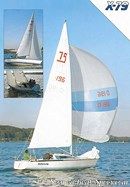
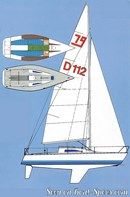


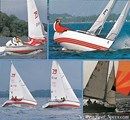
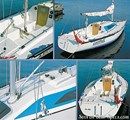


X-Yachts X-79 interior and accommodations - - 7/8
Picture extracted from the commercial documentation © X-Yachts
Picture extracted from the commercial documentation © X-Yachts
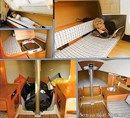

X-Yachts X-79 interior and accommodations - - 8/8
Picture extracted from the commercial documentation © X-Yachts
Picture extracted from the commercial documentation © X-Yachts
Similar sailboats that may interest you:
Sailboats
First built hull
Hull length
1982
24’ 7”7.5 m
1979
30’ 4”9.25 m
1971
30’9.14 m
1978
25’ 6”7.77 m
1985
32’ 7”9.95 m
1982
24’ 7”7.5 m
1993
26’ 2”8 m
1977
20’ 6”6.25 m
1983
22’ 6”6.85 m
1977
24’7.32 m
1984
25’ 5”7.75 m
2010
32’ 10”10 m
1984
35’ 8”10.87 m
1977
23’ 7”7.2 m
1979
30’ 2”9.2 m